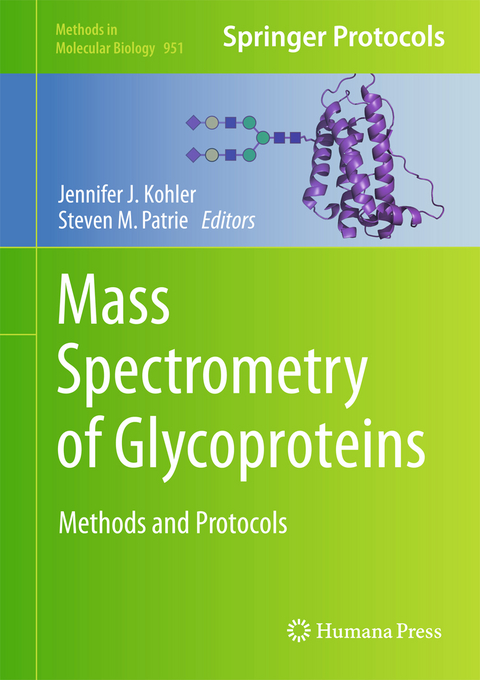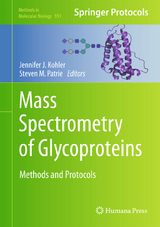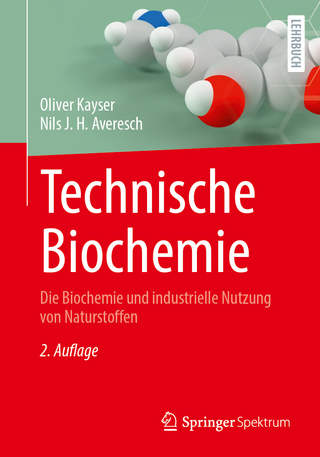Mass Spectrometry of Glycoproteins
Humana Press Inc. (Verlag)
978-1-62703-145-5 (ISBN)
Glycosylation is the most abundant post-translational modification of proteins. Estimates vary widely, but a common assessment is that upwards of 50% of eukaryotic proteins are modified by some type of glycan. In Mass Spectrometry of Glycoproteins: Methods and Protocols, expert researchers in the field detail many of the methods that are now commonly used for glycoproteomics. These methods and techniques include robust sample preparation techniques; advanced chromatographic strategies for improving dynamic range; state-of-the-art mass spectrometry instrumentation and associated ionization and fragmentation methods; and informatics tools used for identifying glycoproteins and characterizing the associated glycans. Written in the highly successful Methods in Molecular Biology™ series format, chapters include introductions to their respective topics, lists of the necessary materials and reagents, step-by-step, readily reproducible laboratory protocols, and key tips on troubleshooting and avoiding known pitfalls.
Authoritative and practical, Mass Spectrometry of Glycoproteins: Methods and Protocol is an essential resource for those who work at the interface of glycobiology and mass spectrometry.
Introduction to Glycosylation and Mass Spectrometry.-Tandem Lectin Weak Affinity Chromatography (LWAC) for Glycoprotein Enrichment.-CSC Technology - Selective Labeling of Glycoproteins by Mild Oxidation to Phenotype Cells.-Use of Boronic Acid Nanoparticles in Glycoprotein Enrichment.-Incorporation of Unnatural Sugars for the Identification of Glycoproteins.-Characterization of Membrane-associated Glycoproteins using Lectin Affinity Chromatography and Mass Spectrometry.-Sialic Acid Capture-and-Release and LC-MSn Analysis of Glycopeptides.-In-Solution Digestion of Glycoproteins for Glycopeptide-Based Mass Analysis.-Nano-HPLC-MS of Glycopeptides Obtained After Non-specific Proteolysis.-Glycopeptide Enrichment for MALDI-TOF Mass Spectrometry Analysis by Hydrophilic Interaction Liquid Chromatography Solid Phase Extraction (HILIC SPE).-Separation and Identification of Glycoforms by Capillary Electrophoresis with Electrospray Ionization Mass Spectrometric Detection.-Structural Separations by Ion Mobility-MS for Glycomics and Glycoproteomics.-Quantitative Analysis of Glycoprotein Glycans.-Stable Isotope Labeling of N-glycosylated Peptides by Enzymatic Deglycosylation for Mass Spectrometry-based Glycoproteomics.-Approaches for Site Mapping and Quantification of O-linked Glycopeptides.-Glycan Profiling: Label-free Analysis of Glycoproteins.-Introduction to Informatics in Glycoprotein Analysis.-Software Tools for Glycan Profiling.-Quantitative Characterization of Glycoproteins in Neurodegenerative Disorders using iTRAQ.-Quantitative Proteomic Analysis of N-linked Glycoproteins in Human Tear Fluid.-Elucidation of N-glycosites Within Human Plasma Glycoproteins for Cancer Biomarker Discovery.-Characterizing the Glycosylation State of Therapeutic RecombinantGlycoproteins.
| Erscheint lt. Verlag | 8.1.2013 |
|---|---|
| Reihe/Serie | Methods in Molecular Biology ; 951 |
| Zusatzinfo | XI, 339 p. |
| Verlagsort | Totowa, NJ |
| Sprache | englisch |
| Maße | 178 x 254 mm |
| Themenwelt | Naturwissenschaften ► Biologie ► Biochemie |
| Naturwissenschaften ► Biologie ► Mikrobiologie / Immunologie | |
| Naturwissenschaften ► Chemie ► Analytische Chemie | |
| ISBN-10 | 1-62703-145-6 / 1627031456 |
| ISBN-13 | 978-1-62703-145-5 / 9781627031455 |
| Zustand | Neuware |
| Informationen gemäß Produktsicherheitsverordnung (GPSR) | |
| Haben Sie eine Frage zum Produkt? |
aus dem Bereich




